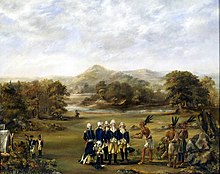Egushawa
Egushawa (c. 1726 – March 1796), also spelled Egouch-e-ouay, Agushaway, Agashawa, Gushgushagwa, Negushwa, and many other variants, was a war chief and principal political chief of the
Background
Egushawa first appears in historical records in 1774, when he signed an indenture granting an island in the Detroit River to Alexis Masonville in 1774, not far from the British Army outpost of Fort Detroit. Nothing is known for certain about his life before that time. He was likely born in the Detroit River region, in what is now Michigan or Ontario. The Odawa were prominent in this area and many had settled around Fort Detroit after it was constructed by the French in 1701. Their influence and territory extended into present-day northwest Ohio, along the Maumee River.
Egushawa came to prominence as a successor to
American Revolution
When the
Egushawa saw much action in the war. He accompanied
In the 1783 peace treaty which ended the Revolutionary War, the British ceded the land of their Native American allies to the United States. Without British military support, Native Americans were compelled to sign various peace treaties which ceded portions of the Northwest Territory to the United States, culminating with the Treaty of Fort Harmar in 1789. Egushawa opposed these treaties and did not consider them to be binding.
Northwest Indian War
After the Revolutionary War,

As a war chief, recruiter, and a diplomat to the British, Egushawa became one of the most prominent leaders in the war. He belonged to the pro-war faction of the confederacy, arguing that the only path to peace was through war, since "the enemy confide in their superior numbers and strength and not on God, who made them and us, nor on the justice of their cause."
Recuperating, he lived on the Maumee or
Egushawa finally agreed to negotiate a peace treaty with the Americans, one of the last chiefs to do so. He signed the Treaty of Greenville on August 3, 1795, ceding much of southeastern Michigan but preserving some of northwest Ohio for Odawa use. He died near Detroit shortly thereafter, probably leaving no descendants.
References
- ^ Curnoe, Greg. Deeds/Nations, Directory of First Nations Individuals in South-Western Ontario, 1750–1850
- ^ Hamilton, Henry. "Hamilton at Vincennes, December 18, 1778, to February 22, 1779". Indiana Historical Bureau. Retrieved 21 Nov 2020.
- ISBN 0-8061-2488-1.
- Curnoe, Greg. Deeds/Nations, Directory of First Nations Individuals in South-Western Ontario, 1750–1850
- Horsman, Reginald (1979). "Egushawa". In Halpenny, Francess G (ed.). Dictionary of Canadian Biography. Vol. IV (1771–1800) (online ed.). University of Toronto Press.
- Sugden, John (1999). "Egushawa". American National Biography. Oxford University Press.
